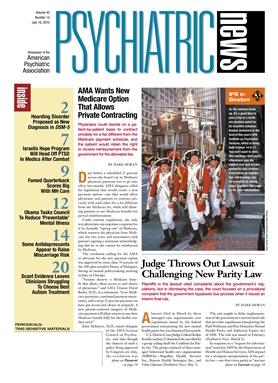Although it has been 40 years since lithium carbonate was approved by the Food and Drug Administration to treat bipolar disorder, exactly how it works has not been clear. A common belief, however, is that it reduces brain inflammation during the manic phase. Indeed, postmortem frontal cortex samples from individuals with bipolar disorder have shown signs of inflammation.
And now another study bolstering the hypothesis that lithium counters bipolar disorder by countering inflammation has been published in the May Journal of Lipid Research.
The study found that when lithium reaches the brain, it both reduces levels of the inflammatory compound arachidonic acid and increases levels of the anti-inflammatory compound 17-OH-DHA, which is formed from an omega-3 fatty acid—docosahexaenoic acid.
Mireille Basselin, Ph.D., a scientist at the National Institute on Aging, and colleagues fed 17 rats lithium chloride for six weeks to produce brain concentrations of lithium that were therapeutically similar to those obtained in patients taking lithium carbonate. They fed 17 other rats a lithium-free diet during the six-week period.
During a six-day period, bacterial lipolysaccharide was infused via cannulas into the brains of both groups of rats to produce an inflammatory response. The rats were then sacrificed, and findings from the brains of the two groups were compared.
The group that had not received lithium had a substantial amount of the inflammatory compound arachidonic acid in their brains, whereas the group that had received lithium did not. In contrast, the group that had received lithium had a substantial amount of the anti-inflammatory compound 17-OH-DHA in their brains, which was not the case for the lithium-free rats.
So it looks as if lithium can reduce levels of the inflammatory compound arachidonic acid and increase levels of the anti-inflammatory compound 17-OH-DHA in the brain. Such actions may explain how lithium helps people with bipolar disorder, the researchers believe.
Moreover, aspirin, like lithium, is known to increase levels of 17-OH-DHA, Basselin told Psychiatric News. So these findings may also explain why researchers recently reported that bipolar subjects who took aspirin plus lithium did even better than those taking lithium alone.
Lithium has also been reported to show some therapeutic benefit in other brain illnesses besides bipolar disorder, Basselin and her colleagues noted, including Alzheimer's disease, amyotrophic lateral sclerosis, and HIV-related dementia. These illnesses, like bipolar disorder, are known to involve brain inflammation. Thus lithium's therapeutic effectiveness against these illnesses may be due to its anti-inflammatory actions, Basselin and her team speculated.
The study was funded by the National Institutes of Health.
